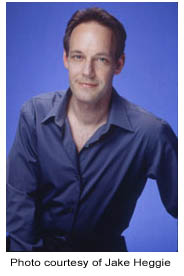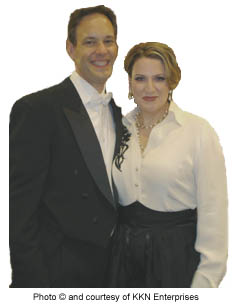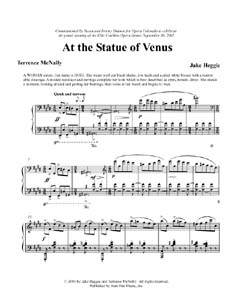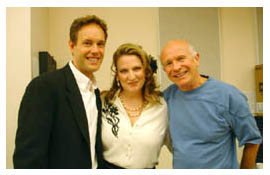
All about "At the Statue of Venus"
(libretto by Terrence McNally)
When in early 2005 Opera Colorado
decided to commission a musical piece in celebration of The Ellie,
it turned to Jake Heggie, arguably the most popular composer of opera
in America today.
Heggie considered it an honor to be commissioned for this very special
occasion - the opening of an opera house after all is not a common
occurrence, even in an active composer's life. That the piece was
to be written for soprano Renée Fleming made the commission
even more special. So, he lost no time in signing up Terrence McNally,
the  famed
playwright who wrote the libretto for his first opera Dead Man
Walking - their first collaborative work and a major "box
office" success as contemporary operas go - to write the text
for the inaugural piece. famed
playwright who wrote the libretto for his first opera Dead Man
Walking - their first collaborative work and a major "box
office" success as contemporary operas go - to write the text
for the inaugural piece.
The result was a lovely, charmingly unpretentious piece, a 20-minute
operatic scene which they called "At the Statue of Venus."
Written in the tradition of Mozart's concert scenes as well as Barber's
and Britten's, it is tonally based (which usually means an ordinary
mortal can sing or hum at least parts of it), very contemporary in
theme (it's about a middle-aged woman, Rose, who's nervously
waiting for a blind date at the statue of Venus in some museum, and
very uneasy about the propriety of the outfit she has chosen to wear
- black slacks!), funny and light, "but
still very very deep into something"
- which was just the way Renée Fleming wanted it - something
she doesn't get to do very often. And both Heggie's music and McNally's
text easily summoned up images of Renée Fleming as Rose. Unfortunately
she ended up not doing it, having been forced by an illness in the
family to withdraw from performing the piece. Long-time Heggie friend
and collaborator soprano Kristin Clayton (shown at right with Jake)
sang in her place and with the composer himself at the piano did a
superb job, very much in character, to the audience's great delight.
CLICK HERE to listen to the full piece, by turns jazzy and operatic, and laugh
with the audience as they did on the evening of its first performance
at the opening concert which was broadcast live on KVOD Denver, 90.1
FM. (Streamed here with permission of Jake Heggie, Kristin Clayton,
and Opera Colorado.)
to listen to the full piece, by turns jazzy and operatic, and laugh
with the audience as they did on the evening of its first performance
at the opening concert which was broadcast live on KVOD Denver, 90.1
FM. (Streamed here with permission of Jake Heggie, Kristin Clayton,
and Opera Colorado.)
| Below,
Jake Heggie during a press conference on the "At the Statue
of Venus" in Denver |
|
|
A funny
thing happened to Jake, not at the statue
of Venus, but at a restaurant in Denver while waiting for
some friends to come.
CLICK HERE
to hear JAKE, attired in a white shirt and black trousers, tell
his story.
Photos ©2005 FanFaire |
In an interview
with FanFaire a few weeks following the concert,
Jake Heggie discussed everything about the piece and the fascinating
art of composing music the Heggie way.
back
to TOP
ALL ABOUT "AT
THE STATUE OF VENUS"
 "Oh
I had a great great time. I thought it was really fun!"
was how Jake Heggie
spoke of the concert celebration at which "At the Statue of Venus"
received its world premiere. [Image
of score © and courtesy of Jake Heggie] "Oh
I had a great great time. I thought it was really fun!"
was how Jake Heggie
spoke of the concert celebration at which "At the Statue of Venus"
received its world premiere. [Image
of score © and courtesy of Jake Heggie]
In their program note, Jake Heggie and librettist Terrence McNally
expressed how deeply honored and challenged they were by the commission.
And humbled as well. "But why humbled?" we asked Jake, who
explained: "Well,
the idea of creating a piece that is first going to be performed at
a brand new opera house is very humbling. Look at the other pieces
that were on there - by which composers and writers? It's Wagner,
it's Verdi... it's, you know, all of these great pieces - and that's
a little overwhelming and humbling all at the same time. It was such
an important occasion, because how often does an American company
open a brand new opera house?"
That of course didn't take
anything away from the fact that his work was the centerpiece of the
concert and, like the arias of the acknowledged masters, connected
directly with the audience. If there is one adjective that correctly
describes Heggie's music, it's "accessible." To some, particularly
those with elitist tendencies, "accessible" is a bad word,
but not to Heggie, who makes no apologies for his music. "Oh,
no," he says, "I want the audience to feel challenged because
they're listening to something new, but not feel alienated because
they can't understand what's coming up." Which
unfortunately is what makes many a contemporary piece of music often
problematic.
It was in January 2005 when he first heard about the prospect for
a commission, without first being told for what and for whom the piece
was to be written. His first impulse was to turn it down because
he was "way
too busy."
That changed when he learned the details. "The
idea of opening an opera house, writing something with Terrence McNally
for Renée Fleming was -- you can't say no to that!
"And you know, at that point what I had in mind was to set the
final monologue from Terrence McNally's 'Masterclass' - where Maria
Callas says farewell and gives some words of wisdom to her audience.
I was all excited about that and then Renée told me, 'No, I
don't want to do something that's kind of a Maria Callas vehicle.
I'd like to do something that's fresh and new, something that had
a lot of humor, I'd love to do something that was originally written
for me. Let's talk to Terrence about doing something new.' Something
that had humor as well as very touching.... So, when Terrence and
I met with her, we already had this idea about a woman waiting for
a blind date."
And how long did it take for that idea to gel?
"Well, we talked
about it and then at the beginning of March was when we talked with
Renée about it. And she loved it! Then we said, 'they only want
it to be 10 minutes long.' And she said, '10 minutes? It should be 15
or 20.' So that's when we decided to make it longer. I unfortunately
forgot to tell Peter Russell about it. He was very surprised when he
got the piece... it was twice as long as what he had expected."
But, we interjected,
Peter said he loved the casualness of the piece, and the humor in the
piece. Too, that it was so fitting a tribute to Ellie Caulkins who's
a casual, unpretentious person.
"We really were hoping to give Renée a piece which showed
this other side of her that people don't really get to see. That was
the idea too, to give her a new kind of vehicle. Not the kind of thing
that you'd expect. That's why we had the woman walking out in slacks,
instead of in something else."
According to Heggie, the black slacks was Terrence McNally's idea. And
it took him only all of 2 hours to write the libretto! After which,
Heggie immersed himself in the text and set out to work on the music
for about 4 months. Then, "During
that week in July, I went to his house and we met like 3 or 4 times...
but it was pretty quick."
And so, both composer and
librettist finally got the piece to where it completely pleased both
of them. Could there have been a more perfect chemistry between
two collaborating artists?
But then Renée Fleming withdrew - with deep regrets.
"It was heartbreaking. Really was. I was pretty devastated. She
told us the last week of July... a month and a half before the premiere.
And I knew it was a hard thing for her to do. Her Mom had been so sick
that she had spent the whole summer with her. She had cancelled some
of her performances in London at Covent Garden - that's not typical
for Renée - to be at home with her mother. Because her mother
nearly died. And I think it really threw her for a loop. You know, when
you get into a situation like that, it's all you can think about.
But I'm very grateful to her that she told us when she did."
And when that happened,
how did Kristin Clayton get into the picture? "I
had played all my compositions for Kristin Clayton for about 10 years
- before they're premiered because she's so close to my sort of musical
theatre aesthetic, and she's very smart about instincts - about what's
working and what's not. She's got good gut reaction. I had played
it for her as I was writing it, and she was really helpful. Then I
realized it was a great piece for her too. She's covered Renée
a lot at San Francisco Opera - she covered her in Rusalka,
in The Dangerous Liaisons, and Herodiade. She has
a very similar voice range...and so when I knew that Renée
was having difficulty with her Mom, I thought we'd better have a cover
just in case. So I asked Kristin to learn it. But she did not become
the official cover until Renée had to back out. And then we
were trying to think - was there another big-name singer that would
work, and then we thought - you know what? Kristin really is great,
she's available, and she'll do a knock-out job."
Which she did, of
course.
"We had such a good time and what was awfully fun was I got to
be on the stage with her. It was the only completely acted scene that
night."
Jake Heggie's friendship
with Kristin Clayton dates back to the days before he gained fame
as the composer of Dead Man Walking, the opera.
"Kristin I met
in 1994 when I first started working at the San Francisco Opera. I
was a writer in the PR Department and Kristin was an Adler fellow.
And I heard her sing, and from the first time I heard her sing, I
said 'Wow! That's the kind of singer I love.'
"And we just became friends, and then she got interested in recording
my music and working with me and helping me to develop projects. She
recorded the song I wrote that won the Schirmer Art Song Competition
back in '95 - 'If you were coming in the fall' (which is on the CD
'Faces of Love.' And then I wrote a cycle for her Schwabacher recital
and that was called 'Eve's Song,' text by Philip Littell who
wrote the librettos for Dangerous Liaisons and Streetcar
Named Desire. She's a great singing actress! That's exactly the
kind of person I like to work with. I'd put her in the same category
as working with Susie Graham, or Bob Orth, Joyce Castle, or any other
great singing actors that we have."
 Because
of a prior commitment, Terrence McNally could not be at The Ellie
for opening night. But in October he was in San Francisco where Jake
and Kristin arranged to have a special performance of "At the
Statue of Venus" in a rehearsal room of San Francisco Opera.
The librettist of course was very pleased to hear his words come to
life, as the photo at left shows. [Photo © and courtesy of KKN
Enterprises] Because
of a prior commitment, Terrence McNally could not be at The Ellie
for opening night. But in October he was in San Francisco where Jake
and Kristin arranged to have a special performance of "At the
Statue of Venus" in a rehearsal room of San Francisco Opera.
The librettist of course was very pleased to hear his words come to
life, as the photo at left shows. [Photo © and courtesy of KKN
Enterprises]
Contemplating opening night at The Ellie, Heggie said "Can
you imagine if I orchestrated it as well? There was no way we would
have been able to have the piece done as there wasn't enough time."
And there he saw a glimmer of the future, as he added, "But
you know, there are a couple of opportunities for next year that I'd
love to do. Now that I've got everything edited and have this recording
[from the radio broadcast],
I'm going to send the whole piece to Renée, and hopefully she'll
reconsider doing it. It needs a big splashy NY premiere. And I just
think it would be such a great piece for her."
And how big an orchestra?
"Oh, I would
think a chamber orchestra. Something like 26 to 28 musicians... I
think that would work really well."
Thus, happily, we
can almost all be sure that "At the Statue of Venus" will
have a future beyond Denver. Bravo, Jake Heggie!
back
to TOP
CLICK HERE to read the rest of the interview
- on
the art of song-writing and composing opera the Heggie way.
|



 famed
playwright who wrote the libretto for his first opera Dead Man
Walking - their first collaborative work and a major "box
office" success as contemporary operas go - to write the text
for the inaugural piece.
famed
playwright who wrote the libretto for his first opera Dead Man
Walking - their first collaborative work and a major "box
office" success as contemporary operas go - to write the text
for the inaugural piece.
 Because
of a prior commitment, Terrence McNally could not be at The Ellie
for opening night. But in October he was in San Francisco where Jake
and Kristin arranged to have a special performance of "At the
Statue of Venus" in a rehearsal room of San Francisco Opera.
The librettist of course was very pleased to hear his words come to
life, as the photo at left shows.
Because
of a prior commitment, Terrence McNally could not be at The Ellie
for opening night. But in October he was in San Francisco where Jake
and Kristin arranged to have a special performance of "At the
Statue of Venus" in a rehearsal room of San Francisco Opera.
The librettist of course was very pleased to hear his words come to
life, as the photo at left shows.